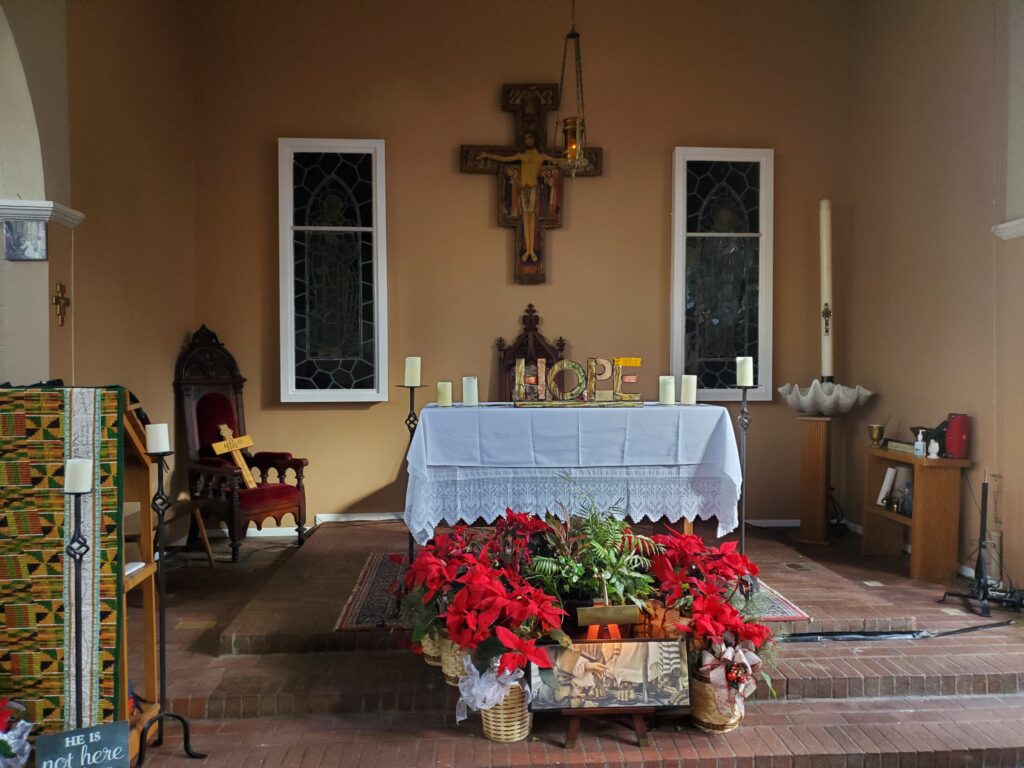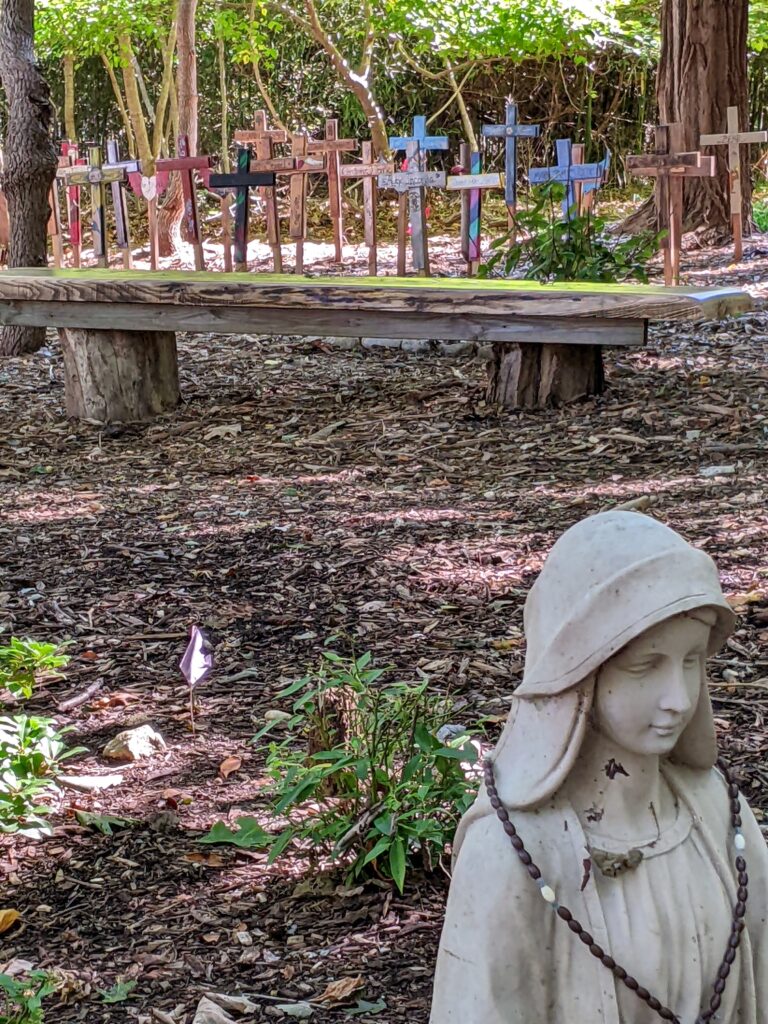Recently I had the opportunity to sit down and chat with Fr. Francis Pizzarelli, the founder and Executive Director of Hope House Ministries.
Founded in 1980, Hope House Ministries has grown into one of the most successful not for profit agencies in New York State. What began as a 10-bed facility providing crisis intervention for young men aged 16 to 21, Hope House is now a full-fledged human service agency, encompassing housing, educational assistance, addiction care and counseling for thousands of individuals in crisis.

Hope House Ministries has two campuses, the main Campus on High Street in Port Jefferson and the Little Portion Friary on Old Post Road in Mount Sinai. While the High Street campus has offices, resource counseling, and residences, the Little Portion Friary has expansive and charming grounds, including an outdoor chapel, a greenhouse, waterfalls, a gazebo and a garden. The Adirondack style gazebo and deck were handcrafted by residents at the Friary, while the house contains an indoor chapel, a bakery, offices and a woodshop.

Born in Brooklyn, Father Francis was ordained as a Catholic Priest on April 28, 1979. Fr. Francis pointed out the significance of April 28, as it so happens to be the feast of St. Louis de Montfort, of whom Fr. Francis is a great admirer.
Louis de Montfort, who was canonized in 1947, was a French priest who practiced in the latter 17th century, dedicating his life to serving the poor and vulnerable. Fr. Francis is proud that he was ordained as a Montfort Missionary.
With his Master’s degree in clinical social work and his postgraduate training as a Drug and Alcohol counselor, Fr. Francis is well positioned to be the Director at Hope House and support its mission of caring for those in need. In addition to his commitment at Hope House, Fr. Francis is also a professor of Social Work at Fordham University’s Graduate School of Social Service and a Professor of Sociology at Suffolk County Community College. Fr. Francis provides counseling to residents at Hope House, presides over mass several times a week and recently led a pilgrimage tour to the Holy Land in Israel. Hope House has a paid staff of 80 employees, including social workers, nurses, counselors, legal experts, food workers and maintenance personnel. They also have close to 300 volunteers. Assisting Fr. Francis is a Board of Directors and an Advisory Board.
Hope House programs serve thousands of people each year, including:
- An emergency shelter for men over age 16 (The Pax Christi Center)
- The Little Portion Friary (to manage long term addiction)
- The St. Louis de Montfort Academy (an alternative junior / senior High School)
- The Siena House (a home for women and women with children who have suffered domestic abuse and crisis)
- The St. Maximilian Outpatient Treatment Center (for those motivated to enter and maintain recovery from addiction)
- The Montfort Therapeutic Residence (for 11–18-year-olds who are under the supervision of the court system)
Hope House Ministries is very goal oriented, as outlined in a recent annual report. Both short and long-term goals are outlined for:
- Family relationships
- Addiction recovery
- Personal goals such as obtaining a GED, driver’s license or vocation
- Mental Health (including medication, counseling, self-esteem and exercise)
At Hope House, “safety, structure and counseling are provided to address the circumstances that can lead to homelessness,” explains Fr. Francis.
Women are supported and afforded positive alternatives to abusive relationships. Ex-offenders are given opportunities for a new lease on life. Those experiencing mental illness can return to healthy lifestyles while those living with an addiction can experience the freedom of recovery.
Fr. Francis was proud to point out that Hope House accepts migrants and immigrants, including the undocumented.
Hope House Ministries collaborates with law enforcement, the court system, juvenile programs, health care facilities, and schools, with the goal of serving and assisting those members of the community who find themselves in a difficult or unsafe situation.

with expansive charming grounds.
One of their most important programs, the Wellness Seminar, is designed for teachers, students and school administrators. The seminar addresses the topics of peer pressure, bullying, drug abuse and teenage suicides.
Fr. Francis noted that Hope House relies entirely on donations and fundraising to maintain its programs, buildings and staff. There is a contract with Suffolk County to run the adolescent program, but it is insufficient, says Fr. Francis. Fr. Francis takes exception with the insurance companies who have not stepped up to support long term residency programs for those affected by mental health and addiction, which typically present as a dual condition to throw people in crisis.
“There are rarely any short-term solutions, and we really need more long-term residency programs,” explained Fr. Francis. He is hopeful to secure funding from the $25 million opioid settlement that was allocated to Suffolk County recently.
Fr. Francis is continually called upon to speak at high schools and colleges, especially on the topics of opioid addiction and Fentanyl.
Fr. Francis showed me the “Garden of Remembrance,” located behind the Little Portion Friary, where there are crosses to mark those that have died from overdoses.
He and Hope House have received numerous awards, which are displayed in the HR building. In 1991, Hope House Ministries was named the 555th Point of Light by the Bush Administration. And in 1996, Fr. Pizzarelli was appointed to President Bill Clinton’s White House Conference on Youth, Drugs and Violence.
On their website, Hope House Ministries has several video testimonials of former residents. One such resident, a freshly released inmate named Kyle, was in dire condition and very uncertain of his future when he arrived. However, with his background in construction, Kyle began working in the woodshop and soon began teaching high school students the foundations of carpentry.
Before long, Kyle gained confidence and learned how to cope with his shortcomings, an accomplishment he attributes to his stay at Hope House.
Another testimonial is from Joe, who makes it clear in his video he would not be alive today if not for Hope House. At Hope House, he lived with a group of guys who became his family. From there, he worked with at-risk adolescents and found his purpose in life. Joe re-focused, dug in, went back to school and now works at Hope House as a social worker.
Hope House also has a women’s program, the Siena House, whose mission is to provide comfort, support and housing to victims of domestic violence and abuse. In the 2021 Annual Report, there is an “Expression of Gratitude” written by a past resident.
Among the kind sentiments written, the former resident states “the staff gave me hope, unconditional love, acceptance, encouragement and so much more.” Women with young children are also welcome at Siena House.
Per Fr. Francis, his mission as a Montfort missionary, as well as his commitment at Hope House, is woven in the Gospel— that all life is sacred and every person has the right to be respected and protected.
“This is especially applicable to young people and families in crisis, including those who find themselves neglected,” Fr. Francis notes.
One former Hope House resident, Michael Hoffner, has written a book, titled God’s Presence in the Present. In his book, Michael describes his spiritual transformation through mental illness and addiction. Michael, who went on to earn a degree in social work, is now the Director of a non-profit holistic health center dedicated to self-discovery and healing.
The web address for Hope House Ministries is https://www.hhm.org/. Here, you can see profiles of the Board of Directors, review the Hope House Ministries mission statement, see the video testimonials from past residents, and learn about future events and how to volunteer or donate.
It is clear from meeting Fr. Francis and visiting Hope House Ministries that their success and effectiveness is based on a holistic long-term approach, where the staff and volunteers provide an empowering sense of love, support and community.
It is that foundation that enables people to address their weaknesses and achieve their goals. These include self-discipline, critical thinking, problem solving and personal responsibility.
Then they are ready, with the grace of God, to face the world again.







